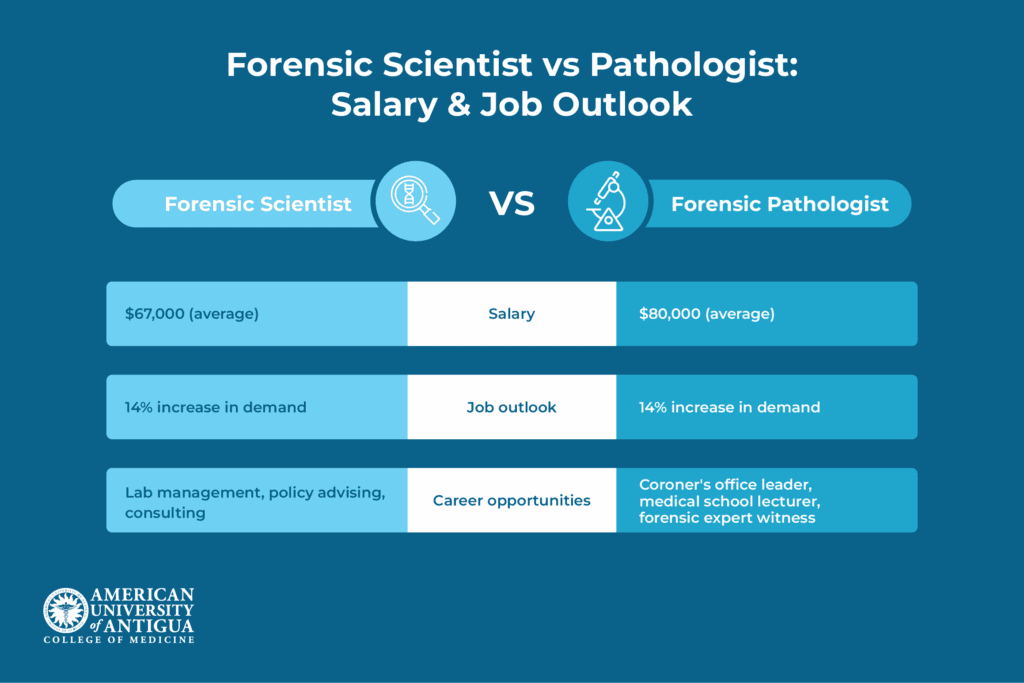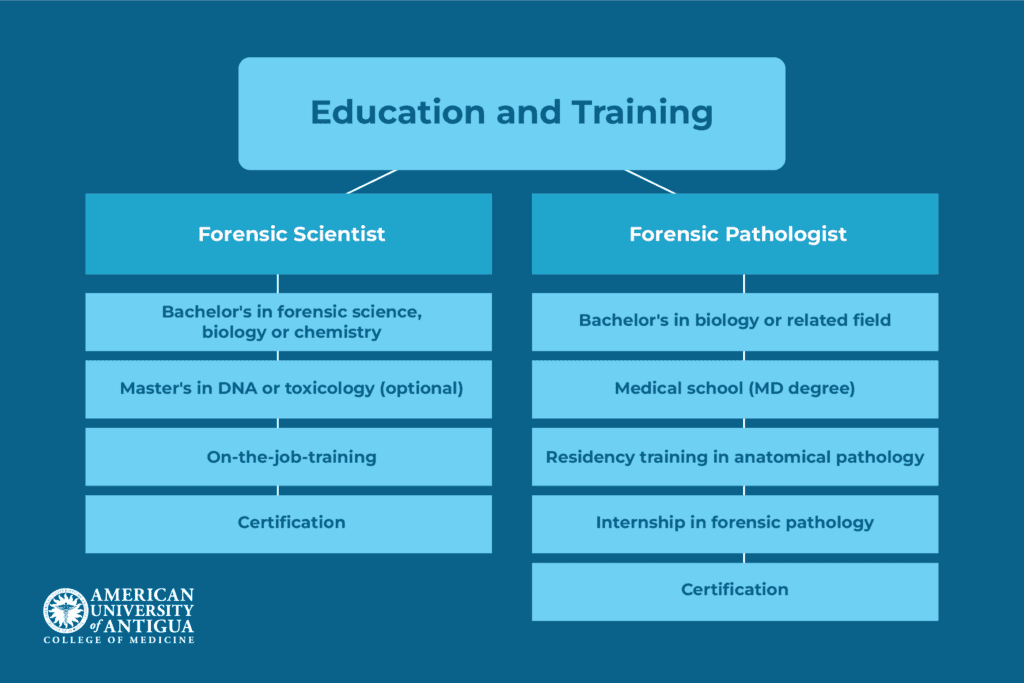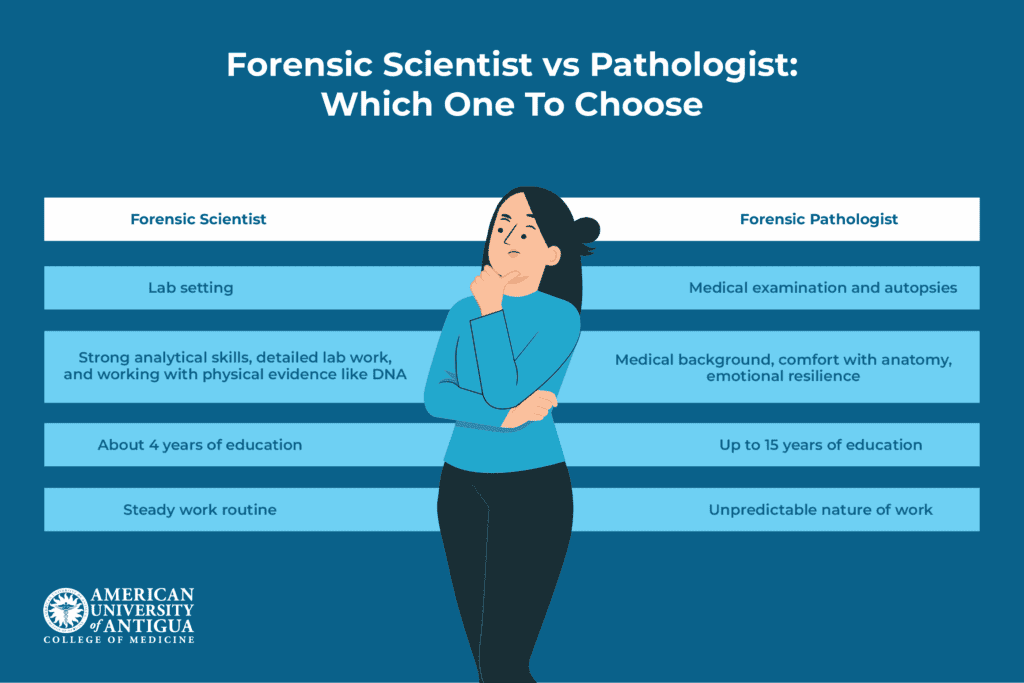Forensic Scientist vs Forensic Pathologist: Career Guide
Key Takeaways
- Forensic scientists focus on lab analysis of evidence, while forensic pathologists are medical doctors who perform autopsies to determine causes of death.
- Forensic pathologists must complete medical school and specialized training, unlike forensic scientists, who typically need a bachelor’s degree and certifications.
- Both careers are in demand with good salary potential, and choosing between them depends on your interests, skills, and comfort with job responsibilities.
Forensics plays a big part in uncovering the truth behind crimes. It’s not all about TV drama scenes and crime labs with flashing lights, though. Real forensic work involves careful analysis, deep science, and different specialties working together.
Two roles that are commonly mistaken for one another are the forensic scientist and the forensic pathologist. They both deal with evidence, but their jobs are very different. Understanding how each one contributes can help clear the confusion.
✅ Request information on AUA's MD program TODAY!
If you’re curious about the difference or considering a career in this field, getting familiar with the role of a forensic scientist vs forensic pathologist is a smart place to start.
What Is a Forensic Scientist?
A forensic scientist examines physical evidence collected from crime scenes to help law enforcement understand the events that occurred.
Their primary focus is lab-based analysis. They don’t typically visit the crime scene or interact with the body, but their work is essential to piecing the case together. Using chemistry, biology, and other scientific methods, they test substances, analyze fingerprints, or match DNA samples.
There are many specialties within forensic science. A toxicologist looks for poisons or drugs in a victim’s system. A DNA analyst matches genetic material to potential suspects. A ballistics expert studies firearms and bullets to trace weapons used in a crime. These scientists turn raw evidence into solid information that can support investigations and legal proceedings.
What Is a Forensic Pathologist?
A forensic pathologist is a medical doctor who determines how and why someone died, especially in cases of sudden or suspicious deaths. Their work often begins at the autopsy table, where they examine the body for signs of trauma, disease, or other causes of death.
Unlike forensic scientists, they’re deeply involved in understanding injuries and interpreting how a person’s final moments unfolded. That’s why forensic pathology plays a major role in homicide investigations, offering key insights that guide police work.
These professionals also testify in court, explaining their findings to judges and juries. Their training includes medical school and specialized education in pathology. Along the way, they learn how to connect physical signs on the body with real-world events. Working closely with detectives and prosecutors, forensic pathologists bridge the gap between medicine and law.
What Is the Difference Between a Forensic Scientist and a Forensic Pathologist?

Although both professionals contribute to solving crimes, their work looks very different in practice. One spends most of the time in a lab analyzing evidence, while the other works with human remains to uncover the cause of death. Their education paths, skill sets, and daily tasks reflect these differences.
Understanding the contrast between a forensic scientist and a forensic pathologist is important for anyone considering a career in the field. It helps set realistic expectations about the work involved and highlights how each role supports the justice system in a unique way.
Educational and training requirements

- Most forensic scientists begin with a bachelor’s degree in forensic science, biology, chemistry, or a similar field, typically taking about four years. Some students go further, earning a master’s (one to two additional years) to specialize in areas like DNA or toxicology.
After graduation, new professionals enter on-the-job training, which can last from six months to three years, depending on their specialty.
While not always mandatory, certifications from boards such as the American Board of Criminalistics or the American Board of Forensic Toxicology help boost credibility. These credentials often require a degree, a few years of experience, passing an exam, and ongoing recertification every few years.
- Becoming a forensic pathologist takes longer. After a four-year undergraduate degree (often in biology or a related field), you need to complete four years of medical school to earn an MD.
Next comes specialized residency training: three years in anatomical pathology (or four with combined anatomic and clinical training), followed by a one-year fellowship in forensic pathology. In total, that’s roughly 13 to 15 years of education and training. Most forensic pathologists in the U.S. also obtain board certification through the American Board of Pathology before practicing.
- The American University of Antigua (AUAMED) offers a Doctor of Medicine program that combines preclinical coursework with hands-on clinical rotations in years three and four. Its structured curriculum prepares students well for medical residency, including pathology tracks. While AUAMED doesn’t offer a specific forensic science degree, our MD program is a solid foundation for anyone aiming to pursue forensic pathology after graduation.
Daily responsibilities and work environments
Although both careers contribute to criminal investigations, their day-to-day responsibilities couldn’t be more different. Forensic scientists focus on processing evidence in controlled lab settings. They rarely visit crime scenes or interact with bodies directly.
Their daily responsibilities include:
- Analyzing DNA, blood, and trace evidence in a laboratory
- Using specialized tools to examine fibers, drugs, or chemicals
- Preparing detailed lab reports based on findings
- Testifying in court as an expert witness when needed
- Collaborating with law enforcement on specific pieces of evidence
Forensic pathologists, on the other hand, are medical doctors who work closely with human remains and often perform autopsies in morgues or hospital-based forensic units. The pace for both can be intense, especially when working on active cases, but the environment and duties are shaped by their specific roles.
They typically:
- Conduct autopsies to determine cause and manner of death
- Examine injuries, disease, or toxicology results in human remains
- Document findings and prepare official death reports
- Consult with detectives and prosecutors
- Testify in court about medical conclusions and autopsy results
Skills and qualities required
Although completing their daily duties requires unique skill sets, forensic scientists and forensic pathologists do rely on some similar qualities to perform their jobs. Skills such as critical thinking to make sense of complex evidence, problem-solving to connect small details to the bigger picture, accuracy, and clear communication are all important in any role.
Apart from these shared skills, forensic scientists also need:
- Strong background in chemistry, biology, or lab-based sciences
- Skilled in handling and analyzing physical evidence like DNA, drugs, or fibers
- Comfortable working with lab instruments and forensic software
- Patience for repetitive lab tasks and long hours of analysis
Forensic pathology, by contrast, necessitates:
- Medical degree with specialized training in pathology
- In-depth understanding of human anatomy and disease
- Manual dexterity for performing autopsies
- Comfort working with deceased individuals
- Frequent interaction with law enforcement and legal professionals
Career outlook and opportunities
When choosing between a forensic scientist and a forensic pathologist, understanding the career outlook, salary potential, and job opportunities is key. Each profession offers unique paths for growth, specialization, and work settings.
Forensic Scientist
The demand for forensic scientists continues to grow steadily. According to the U.S. Bureau of Labor Statistics, jobs in this field are expected to increase 14 percent by 2033, which is much faster than the national average. Crime labs at the state and federal level are expanding, and private sector opportunities are also on the rise.
The average salary for a forensic scientist is around $67,000 per year, though entry-level roles may start closer to $45,000. Experienced scientists, especially those working for federal agencies or in specialized areas like DNA analysis or digital forensics, can earn over $100,000 annually.
There are several opportunities for specialization, including toxicology, ballistics, trace evidence, and cyber forensics. Advancement can lead to roles in lab management, policy advising, or consulting. Most forensic scientists work in government-run labs, but others find jobs in private labs, universities, or even corporate security.
Forensic Pathologist
Forensic pathology faces a significant shortage of professionals across many regions. This makes it a high-demand field, with an 11.4% anticipated increase in demand by 2026, particularly in states where medical examiner systems are under-resourced. Some areas report that more than half of their forensic pathology positions remain unfilled, which can lead to delays in autopsy results and investigations.
Starting salaries for forensic pathologists usually range from $70,000 to $90,000, depending on location and funding. With board certification and experience, salaries often climb to over $200,000 or more for those in leadership roles or private consultancy.
This field allows for subspecialization in areas such as pediatric or neuropathology. Career paths can include leadership in a coroner’s office, teaching at medical schools, or providing expert testimony in court cases. Most work takes place in hospitals, forensic labs, or government agencies, with some flexibility for contract work or locum roles in various regions.
Choose the Right Path for You

Deciding between a career as a forensic scientist or a forensic pathologist takes some thoughtful reflection. Start by asking what parts of forensics genuinely excite you. Do you enjoy working with evidence in a lab setting, using technology and chemistry to solve puzzles? Or does the idea of investigating causes of death through medical examination and autopsies feel like a better fit? Understanding where your interests lie can make a big difference.
Next, consider your strengths and comfort levels. Forensic scientists need strong analytical skills, patience for detailed lab work, and often work with physical evidence like DNA, chemicals, or digital data. Forensic pathologists require a medical background, comfort with anatomy, and emotional resilience to perform autopsies and deliver sometimes difficult findings. Reflect on whether you’re prepared for those realities.
Education and time commitment are also key factors. Becoming a forensic scientist usually requires a bachelor’s degree, with some special certifications, and can take about four years. On the other hand, forensic pathologists must complete medical school, followed by several years of residency and fellowship training, which is a significantly longer path.
Finally, think about your long-term goals. Do you want to specialize, teach, or lead a department? Are you looking for a steady routine, or are you ready for the unpredictable nature of working with criminal cases and autopsies? Imagining your daily life and career path can help clarify which role fits you best.
Conclusion
Forensic scientists and forensic pathologists play distinct but equally vital roles in solving crimes. While forensic scientists focus on analyzing evidence in the lab, forensic pathologists apply medical expertise to determine causes of death.
Both careers require different training and skills, yet they work together within the criminal justice system to uncover the truth. Use this guide to weigh your interests, skills, and goals carefully.
And if you’re serious about pursuing a career in forensic science or pathology, consider attending AUAMED’s medical school, where you can gain the education and training needed to excel in these challenging and rewarding fields.
Frequently Asked Questions (FAQs):
Can you be a forensic pathologist with a forensic science degree?
You cannot become a forensic pathologist with just a forensic science degree because forensic pathology requires medical school and specialized medical training.
What are the important considerations when seeking forensic science careers?
When seeking a career in forensic science, consider your area of interest, the required education, certification needs, and your comfort level with job responsibilities such as crime scene work or lab analysis.
What is the highest position in forensic science?
The highest position in forensic science is often a Chief Forensic Scientist or Laboratory Director, overseeing operations and guiding investigative strategies.
✅ Request information on AUA's MD program TODAY!